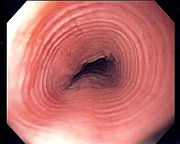Eosinophilic esophagitis overview
|
Eosinophilic Esophagitis Microchapters |
|
Differentiating Eosinophilic Esophagitis from other Diseases |
|---|
|
Diagnosis |
|
Treatment |
|
Case Studies |
|
Eosinophilic esophagitis overview On the Web |
|
American Roentgen Ray Society Images of Eosinophilic esophagitis overview |
|
Risk calculators and risk factors for Eosinophilic esophagitis overview |
Editor-In-Chief: C. Michael Gibson, M.S., M.D. [1]
Overview
Eosinophilic esophagitis is an allergic inflammatory condition of the esophagus. Symptoms are chest pain or heartburn and occasionally dysphagia, or difficulty in swallowing. The disease was first described in children but occurs in adults as well.

Diagnosis is obtained during an upper GI endoscopy where biopsies are taken of the esophagus. At the time of endoscopy, ridges or furrows may be seen in the esophagus wall. Sometimes, multiple rings may occur in the esophagus, leading to the term "multi-ring esophagus" or "feline esophagus" due to the similarity in the rings of the cat esophagus. A high number of eosinophils are seen on microscopic examination of the biopsy specimens. Skin testing can help identify which foods might contribute to this disease, but often skin testing implicates foods that are not involved. Common allergens in the GI tract are cow's milk, soy, egg and wheat.

Treatment strategies include removal of the offending food, proton pump inhibitors to decrease acidity in the stomach that may reflux into the esophagus, inhaled steroid puffers taken orally and swallowed, anti-histamines, H2-receptor blockers such as cimetidine, leukotriene modifiers such as montelukast, and, in investigational reports, the anti-IL5 monoclonal antibody mepolizumab. Refractory patients may require oral steroid medications.
